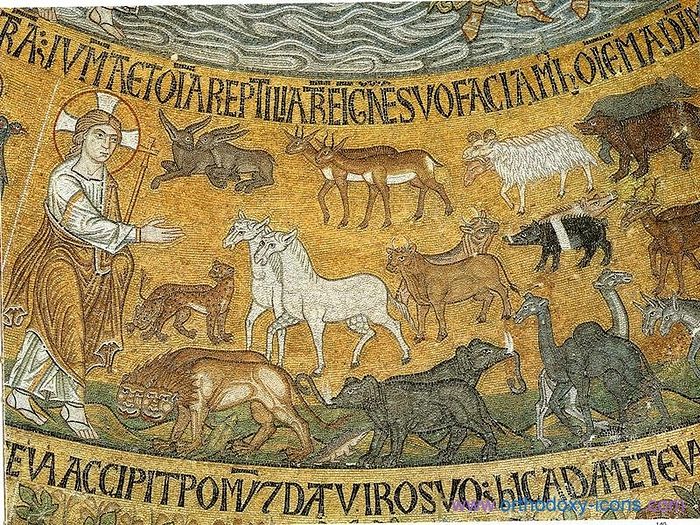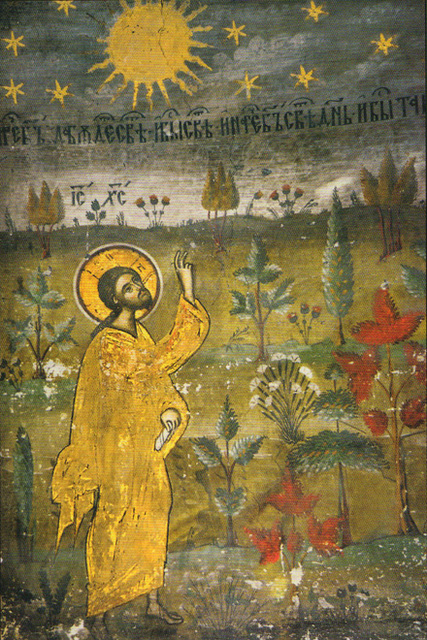In his homilies on January 1, the day that the Church commemorates St. Basil the Great,
Fr. Thomas Hopko loved to say, quoting His Grace
Archbishop Dimitry (Royster), “Gregory is the Theologian, John is the Golden-mouthed, but only Basil is
the Great.”
[1]
As Fr. Hopko would explain, St. Basil was a man of numerous gifts and talents. He is remembered as a great theologian, a bulwark against heresies, a pastor, a teacher, a
philanthropist, a rhetorician, an ascetic, and generally one of the greatest saints to ever grace the Church of Christ. Among these many laurels, as a theologian St. Basil is distinguished as a luminous visionary of the dogma of creation. His
Hexaemeron, or commentary on the six days of creation, delivered as a series of nine sermons during Lent sometime around 370 AD, has stood the test of time to become the Church’s most authoritative text on the matter.
That this is the case can be discerned not only in studying the unbroken chain of Church Tradition, continuing to our very day, into which St. Basil placed himself, thereby finding agreement between his teachings and that of the saints for twenty centuries, but can be plainly seen in the praise that several other righteous fathers and respected theologians have heaped upon him, and specifically for his Hexaemeron.
A few years later,
St. Ambrose of Milan delivered his own homiletical
Hexaemeron which is in large part an expansion upon the work of St. Basil. Although he never mentions the great Cappadocian by name, he does refer to his description of day and nighttime as from an “expert author” who has “precedence over us whether in time or in ability.”
[2] St. Jerome, in his
On Illustrious Men in which he recounts the lives and works of the great saints of the Church up to his day, writes that St. Basil composed an “admirable carefully written book” on the days of creation.
[3] And in the seventh century, St. Anastasius of Sinai wrote in his
Hexaemeron: “Basil had divine thoughts and spoke sublimely.”
[4]
More extensive and explicit praise is offered by several other great fathers of the Church, including St. Basil’s friend, the Patriarch of Constantinople,
St. Gregory the Theologian, who, upon the occasion of St. Basil’s funeral offered such exalted words: “I will only say this of him. Whenever I handle his
Hexaemeron, and take its words on my lips, I am brought into the presence of the Creator, and understand the words of creation, and admire the Creator more than before, using my teacher as my only means of sight.”
[5] Elsewhere in the same oration he compares his friend with great teachers, prophets, and martyrs of old, as a man of great merit, and notes that whereas Adam failed to keep the law of God, “Basil both received and observed it, and received no injury from the tree of knowledge, and escaped the flaming sword, and, as I am well assured, has attained to Paradise.”
[6]
St. Basil hails from a
family of several generations of saints, including his equally famous brother
St. Gregory of Nyssa. In his
Apologia to His Brother Peter[7] on the Hexaemeron he speaks of people who consider the “divinely inspired study” of the great bishop of Caesarea as being not inferior to the creation account of Moses himself, and of these people he states:
I am quite certain that these people are correct because he who has this faculty resembles a grain from an ear of corn; although [Basil] was not this ear, he had the power to change into something great and beautiful and be endowed with a form with many facets. Should anyone maintain that the great Moses' voice can be explained through the distinguished Basil by having a clearer understanding--for the teacher's few words effect an increase--such appropriate utterances derive from a lofty philosophy; it is not the ear but the tree according to which the kingdom of heaven was compared, that is, a mustard seed …[8]
And giving his own estimation, which has passed into history as an expression of the mind of the Church, he continues: “Before I begin, let me testify that there is
nothing contradictory in what the saintly Basil wrote about the creation of the world since no further explanation is needed. They should suffice and alone take second place to the divinely inspired Testament” (emphasis added).
[9]

One of the greatest fathers of the early age of the Church,
St. John Damascene, living in the seventh and eighth centuries, wrote of the “divine” St. Basil in reference to his
Hexaemeron in his own enduring classic
The Exact Exposition of the Orthodox Faith that he is “versed in the mysteries of divine Scripture.”
[10] In the ninth century the pillar of Orthodoxy and patriarch of Constantinople St. Photios the Great wrote his
Bibliotheca or
Myriobiblion which is a collection of 280 abridgements and fragments of classic works from both secular and patristic authors. Continuing in the vein of the earlier great Cappadocian hierarchs, St. Photios also spoke of St. Basil’s commentary on creation with great admiration and urging:
Read the work of St. Basil on The Six Days' Work. He is admirable in all his writings. More than anyone else he knows how to use a style that is pure, distinct, suitable, and, in general, political and panegyrical; in arrangement and purity of sentiment he is second to none. He is fond of persuasiveness and sweetness and brilliancy, his words flow on like a stream gushing forth spontaneously from a spring. He employs probability to such an extent, that if any one were to take his discourses as a model of political language, and practice himself in them, provided he had some acquaintance with the rules connected with it, I do not think he would need to consult any other author, not even Plato nor Demosthenes, whom the ancients recommend those to study who desire to become masters of the political and panegyrical style.[11]
Clearly, St. Basil’s reputation, and that of his
Hexaemeron were firmly set in the early centuries of the Church. In recent times science has made great strides and many wonderful discoveries about God’s creation, and it has also often entered into the philosophical realm of the creation and history of the world. In this atmosphere, the work of the fourth century bishop from Caesarea has continued to endure and shine as a bright star. The saints and holy elders of our times who offer interpretation of Genesis continue to speak in harmony with the great Basil, as they all enter into the same Tradition and acquire the same mind of Christ, beholding,
as prophets, the creation of the world.
Fr. Michael Pomazansky, a noted theologian of the Russian Church Abroad, who was trained in pre-revolutionary Russia, in a work entitled
Talks on the 6 Days by St. Basil the Great and Talks on the Days of Creation by St. John of Kronstadt, in which he demonstrates the similarity of the works of these two giants among the saints, says of St. Basil’s work: “his
Hexameron stands out as a bright and exalted system which reveals the meaning of Genesis, and reigns above the former [theories] as a bird soars above the creatures which are able to move only along the earth.”
[12]
The genius of St. Basil, as with all the saints, is that he was a man of profound humility, and for this reason the Lord drew near to him.
[13] As a humble servant, St. Basil sought not to pass on the constructions of his own mind, but rather only to enter into the life-giving stream of Tradition and to impart it to his flock, in words of flowing grace. As he himself stated: “We are proposing to examine the structure of the world and to contemplate the whole universe,
not from the wisdom of the world, but from what God taught His servant when He spoke to him in person and without riddles (emphasis added),”
[14] and following a digression on pagan notions of the firmament he insisted: “Let us leave the accounts of outsiders to those outside, and turn back to the explanation of the Church.”
[15]
Thus, clinging as he did to the mind of Christ that was in him, Fr. Michael can say of the great Basil:
St. Basil acknowledges all the scientific facts of natural science. But he does not accept the philosophical conceptions, or the interpretations of the facts, which were contemporary to him: the mechanistic theory of the origin of the world, the teaching of the eternity and unbeginningness of the natural world [and the like]… St. Basil the Great knew how to raise himself above the theories contemporary to him concerning the basic principles of the world, and his Hexameron stands out as a bright and exalted system which reveals the meaning of Genesis, and reigns above the former [theories] as a bird soars above the creatures which are able to move only along the earth.
He was not shackled by the limitations of the natural sciences and philosophies of his day, but rather rose above them to see the pure truth of the Living God, as our saints today continue to do. One of the most respected theologians of our day,
Met. Hierotheos (Vlachos), is in agreement: “Basil the Great does not entirely accept the science of his time, but he judges it by theological criteria, as can be seen in his homilies about the six days of creation.”
[16]
I would urge us to be not too certain of our accustomed ways of looking at Genesis, and to open ourselves to the wisdom of the God-bearing men of the past who have devoted so much intellectual effort to understanding the text of Genesis as it was meant to be understood. These Holy Fathers are our key to understanding Genesis.[17]
Thus, taking the same stance of humility as did his great predecessor in the faith, Fr. Seraphim drew heavily upon the work of St. Basil for his own exposition, and through prayer came to feel especially close to St. Basil.
[18]
St. Basil is a truly great saint—a man of deep prayer, humility, pastoral wisdom, philanthropic love, and deep philosophical and theological knowledge. As Fr. Hopko would say, no matter what we are looking for in a Christian man and pastor, we can find it in St. Basil. Today, as in times past, we continue to wonder about our origins and where to look for answers, and to this the Church presents to us the radiance and purity of the Hexaemeron of St. Basil, second only to the words of Moses himself. The saints, elders, and theologians of every age have read and understood the greatness of St. Basil encapsulated in his Hexaemeron, and for this, among so many other reasons, we continue to honor him today.
 Photo: goarch.org
Photo: goarch.org  Photo: goarch.org
Photo: goarch.org 

